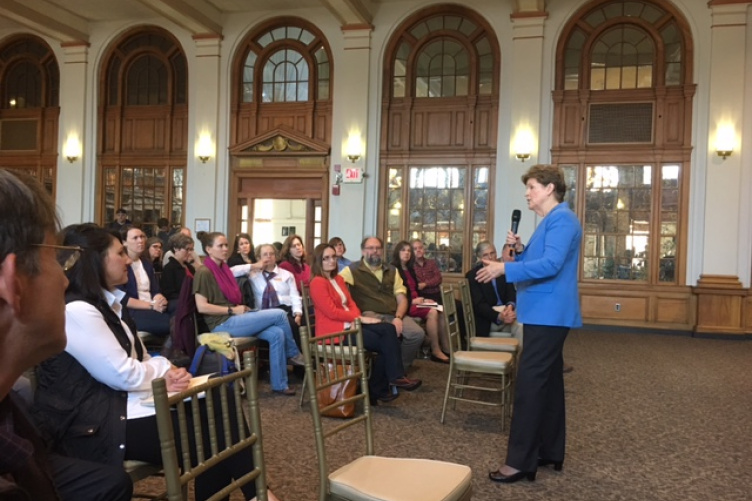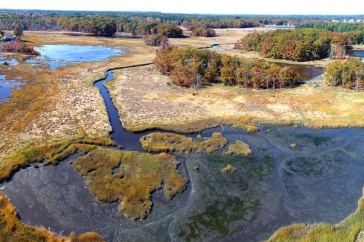
Sen. Jeanne Shaheen met with UNH faculty and student researchers Thursday, April 20, to discuss the impact of the federal budget on support for research. (Photo: Mica Stark)
Research at public universities drives economic growth and global progress, UNH faculty and student researchers told U.S. Sen. Jeanne Shaheen at a meeting in Huddleston Hall last week. And if President Donald Trump’s proposed cuts to that funding are adopted, the U.S. would fall significantly behind in innovation, they said.
“I used to be very proud to go to international meetings,” said Harlan Spence, director of the Institute for the Study of Earth, Oceans and Space (EOS) at UNH. “At that point, we were looking in the rearview mirror at other nations and partners behind us. Now I see a lot of taillights.” The U.S. is losing its competitive edge, he said.
President Trump's proposed budget sends “a message about what we value in the U.S,” Shaheen said. “That’s what I find most troubling.”
Spence was among five UNH researchers, introduced by senior vice provost for research Jan Nisbet, to formally share their concerns with Shaheen; many others in the audience of nearly 100 also voiced questions and comments in a question-and-answer session. The senator and former New Hampshire governor is the lead Democrat on the Commerce, Justice, Science Appropriations Subcommittee tasked with authoring annual funding bills for the National Oceanic and Atmospheric Administration (NOAA), National Aeronautics and Space Administration (NASA), National Science Foundation and other agencies.
Jennifer Miksis-Olds, research professor and associate director of research in the School of Marine Science and Ocean Engineering, and interim N.H. Sea Grant director Erik Chapman expressed concerns on behalf of research that seeks to understand our coasts and oceans. Looking to the long game, Miksis-Olds described the impact of cuts to future generations of scientists and to important policy guiding marine exploration and protection. “Taking science through policy is a long process, it’s a difficult process, it relies on the best available science. Cuts to science in general will affect that whole process,” she said.
Also speaking were David Finkelhor, director of UNH’s Crimes against Children Research Center and EOS research assistant professor Liz Burakowski, who researches climate change and the economic impact of snow. “For New Hampshire, it’s not just about recreation. Snow is currency,” she said, noting that skiing and tourism, threatened by a changing climate, support many jobs in New Hampshire.
While the rest of New Hampshire’s congressional delegation (Sen. Maggie Hassan and Reps. Ann Kuster and Carol Shea-Porter, all Democrats) share similar views, Shaheen stressed the importance of reaching out to state lawmakers and the governor, noting the success of such grassroots advocacy in helping ensure the House couldn’t repeal the Affordable Care Act. “We need to make sure this message gets through to Concord, to our state reps, to our governor,” she said.
Shaheen assured the researchers that Trump’s budget, like most executive budget proposals, would change significantly before it’s passed. Still, she said, it projects an unfortunate message to the world. “It’s a message about what we value in the U.S,” she said. “That’s what I find most troubling.”
-
Written By:
Beth Potier | UNH Marketing | beth.potier@unh.edu | 2-1566
















































